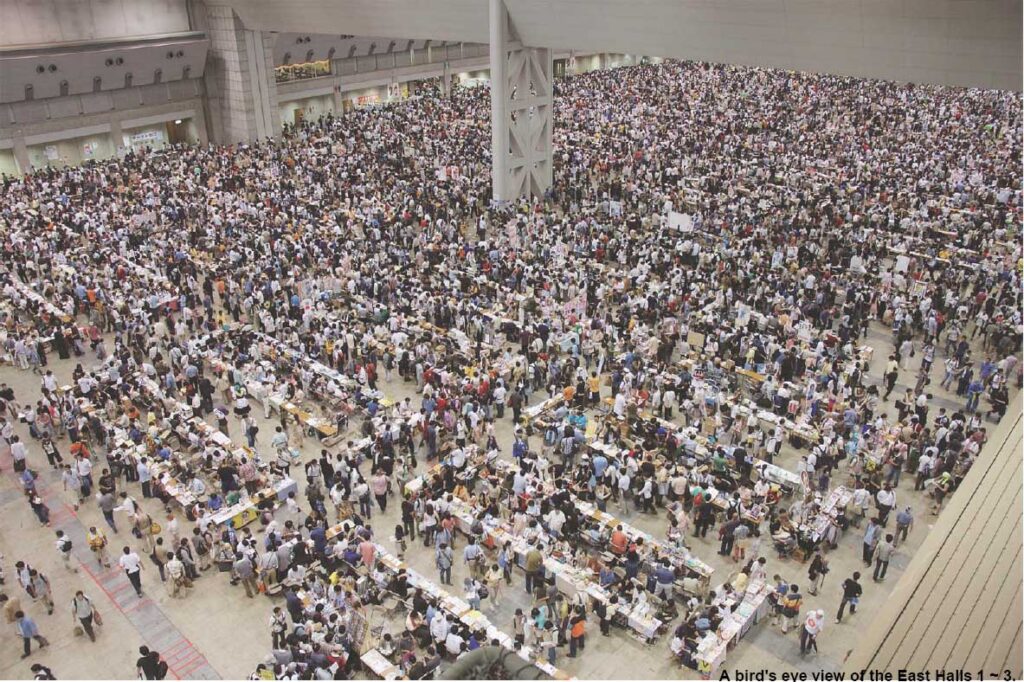As an anime fan, you may have come across this term on the internet and wondered, what exactly are Doujin and Doujinshi; what is the difference between them? These words are often mixed up and falsely used interchangeably, so we will clear up the confusion in this article.
Duojin is not short for Doujinshi, in fact Doujinshi is a sub-group of a bigger classification of people Duojin. We will explain both terms properly in this article and clear up this confusion.
What is Doujin
Doujin (同人) is a group of people who share similar interests and hobbies or stand to achieve something. It is the Japanese word for a hobbyist that is producing some type of creative content in relation to this interest. It is a wide category of people who may be into music, video games, magazines, anime and so on.
Doujin can also be used short for “Doujin works”, the products created by these niche hobbyists. In this sense, the word is often translated as “fandom” or “fanfiction”. These works can be very diverse in content and the mediums used to create them.
Doujin artists sometimes base their material on the work of other artists. They publish their creation in small numbers for maintaining a low profile to avoid litigation. Thanks to personal publishing technologies, Doujin has expanded and now creators from around the world are able to publish, promote and distribute their work
What is Doujinshi
The printed Doujin works—fan comics, magazines and manga—are collectively known as doujinshi. This is why I said at the beginning of the article that doujinshi is a sub-group of Doujin, not the reverse! Doujin is considered amateur work but there are some professional artists who participate in this culture to publish their material outside of the regular publishing industry.
In other words, Doujinshi is a self-published magazine or publication that caters to a specific group of people. Doujinshi tends to be the work of amateurs. The stories are often created in a way that they aren’t suitable for general publication.
What Kind of Doujinshi are Out there?
Doujinshi typically fall into two categories – spin-offs and originals.
Spin-offs are the fan-fiction stories you see floating around the internet that expand on well known and loved stories with original content. They are fun to read and can expand the universe created by an original author that has finished writing the story. In some cases fan-fiction can explore hypothetical scenarios that the story didn’t take as well, which can be interesting and pleasing for some part of the fandom. Fan-fiction allows a story to extend after a published series ends or can be picked up halfway through for establishing an alternate fan cannon.
Originals are completely new stories created by independent Doujinshi publishers for different reasons. These can vary from amateur, indie, to obscene or shocking content that is not fit for regular publishing. For better or for worse, Doujinshi has become an integral part of the anime fandom. These stories are shared online or at Doujinshi conventions.
Is Doujin Legal?
The moment you understand Doujinshi, it’s fair to ask if it’s legal. Technically it’s illegal but whether or not you get in legal troubles depends on the country you live in, and the popularity of your spin-off creation. If the Doujinshi is original work, then it’s legal, of course.
In Japan, you can get away with it but in countries like the USA, you can get into real trouble if you spin-off a creator’s work and get caught. That’s why creators keep their projects from getting widespread attention. As long as the content stays low-key, you can make some money out of it.
In Japan, things are completely different. Yes, copyright laws exist but they can’t be enforced without a complaint from the rights holders and seldom do the rights holders in Japan complain. As with all unofficially published content there is
Can You Make Money With Doujin?

The Doujinshi artists don’t really make money. Even if they do earn, it’s not enough to make a living. In fact, a survey conducted on 4000 Doujinshi artists revealed that they don’t even make a living.
The Doujin fandom is more about passion than making a profit. A vast majority of the creators never get close to covering the money spent on printing and distributing their content. They are able to showcase their content through conventions like Comiket and showing their work to other people is all the reward they expect.
Some artists are able to earn money through their work but we are talking about marginal sums. On the other hand, there are groups of professional mangaka who prefer participating in Doujinshi conventions because they can make more money there than with commercially published work. The situation differs really. If they can sell their work via Doujinshi conventions, at least they get to keep all the profits to themselves rather than sharing them with publishers and distributors.
Conclusion
So there you have it, you should now be able to tell the difference between Doujin and Doujinshi even in your sleep. Let us know in the comment section below, what do you think about these works? Are they simply amateur outcasts, or do they provide crucial content for the anime community?
